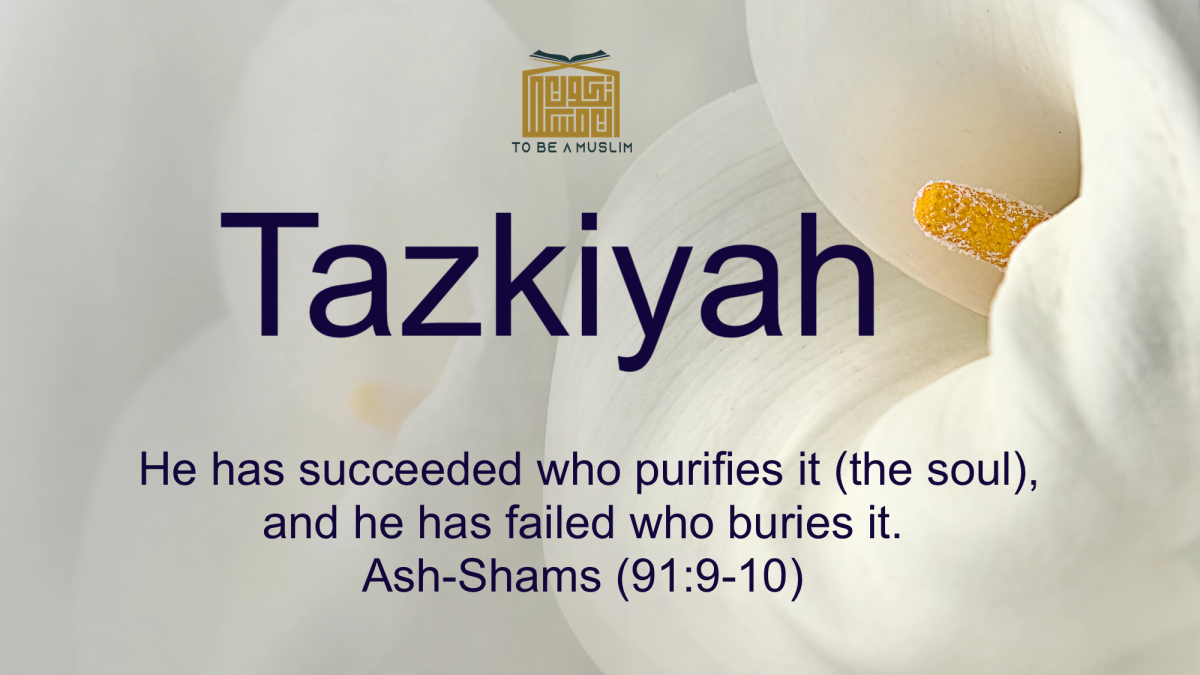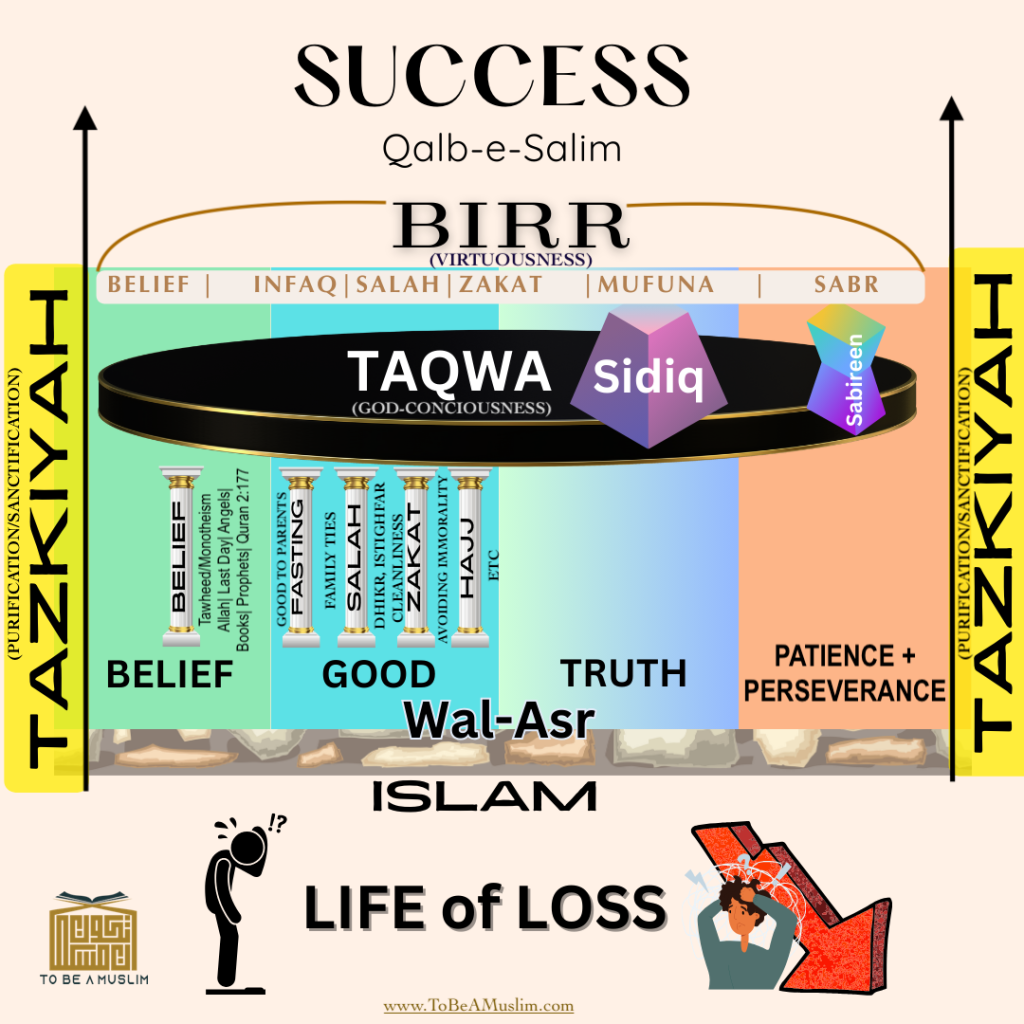
Tazkiyah: Purification/Sanctification
Tazkiyah (Purification/Sanctification): is the essence and core of faith, encompassing the entire spectrum of a believer’s life. It is not merely a part of Islamic practice; it is the Deen itself, a continuous journey of spiritual, moral and behavioral purification and sanctification or refinement. This journey, reflecting the divine purity of Allah as Al-Quddus (The Pure, The Most Holy), is about aligning every facet of one’s existence with this divine attribute. It is the pure that are successful, it is only the purified that will be admitted to Jannah (paradise) and the presence of Al Quddus, not the filthy. The Qur’an and the Hikmah – righteous wisdom contain guidelines to purify the life of the faithful.
Pinnacle of Ihsan
Tazkiyah, an Arabic-Islamic term meaning ‘sanctification’ or ‘purification of the self’, refers to the process of transforming one’s nafs (carnal desires) from self-centeredness and immorality to a state of purity and submission to God’s will. From self-servitude and vice to God-devotion and good work. It involves learning and applying shariah (Islamic religious law) and the sunnah (traditions of Prophet Muhammad) to achieve spiritual awareness of God. This includes being constantly aware of His presence and omniscience, and engaging in continuous dhikr (remembrance) of Him while abstaining from sin and impurity. Tazkiyah is seen as the pinnacle of ihsan (religious social responsibility), one of Islam’s three dimensions. A person engaged in this process is known as a zaki.
Tazkiyah, derived from the root “Za-Ka-Wa,” refers to purification or growth. It’s often used in a spiritual or moral context, implying the purification of the soul from sinful behaviors and the cultivation of virtuous qualities.
From Lowly Beast to Angelic Purity
Tazkiyah is about inner transformation and growth towards spiritual and moral excellence. It involves cleansing the heart from spiritual maladies like envy, greed, and arrogance, and nurturing virtues like humility, generosity, and patience, from an ignorant God-less state of being, like that of the lowest beast to a knowledgeable God-conscious angelic state.
In the Quran, Tazkiyah is sometimes associated with knowledge and wisdom, as it involves understanding and implementing divine guidance in one’s life. For example, Surah Al-Jumu’ah (62:2) mentions the role of the Prophet Muhammad in purifying and teaching the community.

The Prophet Muhammad’s (saw) mission to purify his followers underscores the significance of Tazkiyah, reinforcing the belief that achieving purity is a primary goal in Islam. It involves a continuous effort to cleanse the soul, refine moral conduct, and enhance behavioral righteousness.
Father of the faith, Ibrahim (as) prayed:
“Our Lord, and send among them a messenger from themselves who will recite to them Your verses and teach them the Book and wisdom and purify them. Indeed, you are the Exalted in Might, the Wise.”
Surah Al-Baqarah (2:129)
And the prophet of Islam (saw) came in answer to that prayer to do just that:
“Just as We have sent among you a messenger from yourselves reciting to you Our verses and purifying you and teaching you the Book and wisdom and teaching you that which you did not know.”
Surah Al-Baqarah (2:151)
Survival of the Purest
Tazkiyah contrasts sharply with the worldly view of ‘survival of the fittest,’ where success is often pursued through material gain and competition, employing all selfish means including corruption and deceit. The righteous way gives a totally different paradigm with ‘survival of the pure,‘ focusing on spiritual growth, moral integrity, and ethical conduct being its guideline. This is beautifully encapsulated in Surah Ash-Shams (91:9-10): “He has succeeded who purifies it (the soul), and he has failed who instills it [with corruption].”
The Prophet Muhammad’s mission to purify his followers underscores the significance of Tazkiyah, reinforcing the belief that achieving purity is a primary goal in Islam. It involves a continuous effort to cleanse the soul, refine moral conduct, and enhance behavioral righteousness. From the day a person reverts to Islam, being finally in a purified form, dedicated to Allah and cleansed of misdeeds, the journey of a Muslim is one of constant purification or tazkiyah.
Tazkiyah, along with tarbiyah (self-development) and ta’lim (education), transcends conventional learning, shaping righteous living and constant mindfulness of one’s relationship with God. The term’s etymology, related to pruning a plant, symbolizes removing harmful traits and spiritual maladies, essential for experiencing God. In Islam, the ultimate aim of the religion and its laws, and the core purpose of prophethood, is the enactment and teaching of Tazkiyah.
Zakat: Purification of Wealth
Zakat, a pillar of Islam, is intrinsically linked to Tazkiyah. Coming from the same root as Tazkiyah, Zakat literally means ‘purification.’ It involves giving a fixed proportion of one’s savings to the needy, serving to purify the giver’s remaining wealth and soul. As the believer acknowledges that the needy have a right over their wealth as stated in the glorious Qur’an. Zakat wealth purification is an obligation that enhances social welfare and promotes the redistribution of wealth, thereby blessing the entire community.
Qalb-e-Salim Purification End Goal
The concept of Qalb-e-Salim, or the “pure heart,” represents the ultimate goal of spiritual purification in Islam. It signifies a heart cleansed of spiritual maladies such as envy, hatred, and greed, and filled with qualities like gratitude, charitability, love, compassion, and sincerity towards Allah. The importance of possessing a pure heart is underscored in the Qur’anic prayer by Ibrahim (as), which states,
“But only one who comes to Allah with a pure heart [will be saved].”
Ash-Shu’ara (26:89)
This verse highlights that on the Day of Judgment, the most critical criterion for salvation and entry into heaven is the purity of one’s heart. The ceaseless journey of Tazkiyah, or self-purification, in Islam, is thus fundamentally geared towards attaining Qalb-e-Salim, a state where the heart is devoted entirely to Allah, free from the distractions and corruptions of worldly desires.

Purification Is Ultimately In Allah’s Hands
Like guidance, only Allah guides, and so it is with purification. It is Allah’s favor and mercy that ultimately purifies. None can purify himself except that Allah favors him with it.
O believers! Do not follow the footsteps of Satan. Whoever follows Satan’s footsteps, then ˹let them know that˺ he surely bids ˹all to˺ immorality and wickedness. Had it not been for Allah’s grace and mercy upon you, none of you would have ever been purified. But Allah purifies whoever He wills. And Allah is All-Hearing, All-Knowing.
Qur’an 24:21

Elements of Tazkiyah:
- Charity and Generosity:
- Surah At-Tawbah (9:103): “Take from their wealth a charity by which you purify them and cause them increase…” emphasizes the role of charity in purifying both the giver and the receiver.
- Surah Al-Layl (92:18): “And [for] him who gives his wealth to purify himself,” highlighting the importance of generosity in self-purification.
- Dhikr (Remembrance of Allah): Engaging in Dhikr keeps the heart attuned to the presence and majesty of Allah, serving as a continual source of spiritual purification.
- Istighfar (Seeking Forgiveness): Regularly asking for Allah’s forgiveness helps cleanse past transgressions and reorient the believer towards righteousness.
- Righteousness and Ethical Living (Surah Al-Qalam 68:4): Upholding Islamic values and principles is fundamental to Tazkiyah, guiding one’s actions and decisions towards ethical living.
- Engagement in Worship and Constant Remembrance of Allah: Regular practices like Salah (prayer), Sawm (fasting), Dhikr (remembrance of Allah), and continuous mindfulness of Allah’s presence are vital for maintaining spiritual connection and inner purity.
- Seeking Knowledge: Gaining and imparting knowledge of Islamic teachings aids in understanding and practicing the path of righteousness and purity.
- Avoiding Sinful Behavior: Actively avoiding actions that are detrimental to the soul is key to maintaining spiritual and moral purity. (Qur’an 24:28; 24:30)
- Cleanliness (Toharah): (Surah Al-Ma’idah 5:6): Observing physical cleanliness in rituals like Wudu and Ghusl reflects the importance of purity in Islam. Charity serves to cleanse (toharah) and ultimately purify (tazkiyah) [Qur’an 9:103].
Tazkiyah is the embodiment of Islam itself, representing the path that leads to divine proximity through purification. It is about living in a way that is constantly attuned to the purity of Allah, aspiring to achieve a state of spiritual, moral, and behavioral excellence. Tazkiyah is not just a means to an end but the very essence of a Muslim’s life, defining their relationship with Allah, themselves, and the world around them. An exemplary nature that radiates the light of Islam to those around them and makes the world the beautiful and loving place it could be. Through Tazkiyah, Muslims seek to fulfill the true purpose of their existence, striving for a life of purity that epitomizes the essence of their faith.
Related
Verses Related to Purification in the Bible
1 Peter 1:22:
“Now that you have purified your souls by your obedience to the truth so that you have genuine mutual love, love one another deeply from the heart.”
James 4:8:
“Draw near to God, and he will draw near to you. Cleanse your hands, you sinners, and purify your hearts, you double-minded.”
2 Corinthians 7:1:
“Since we have these promises, dear friends, let us cleanse ourselves from everything that can defile our body or spirit. And let us work toward complete holiness because we fear God.”
Ephesians 4:22-24:
“You were taught, with regard to your former way of life, to put off your old self, which is being corrupted by its deceitful desires; to be made new in the attitude of your minds; and to put on the new self, created to be like God in true righteousness and holiness.“


